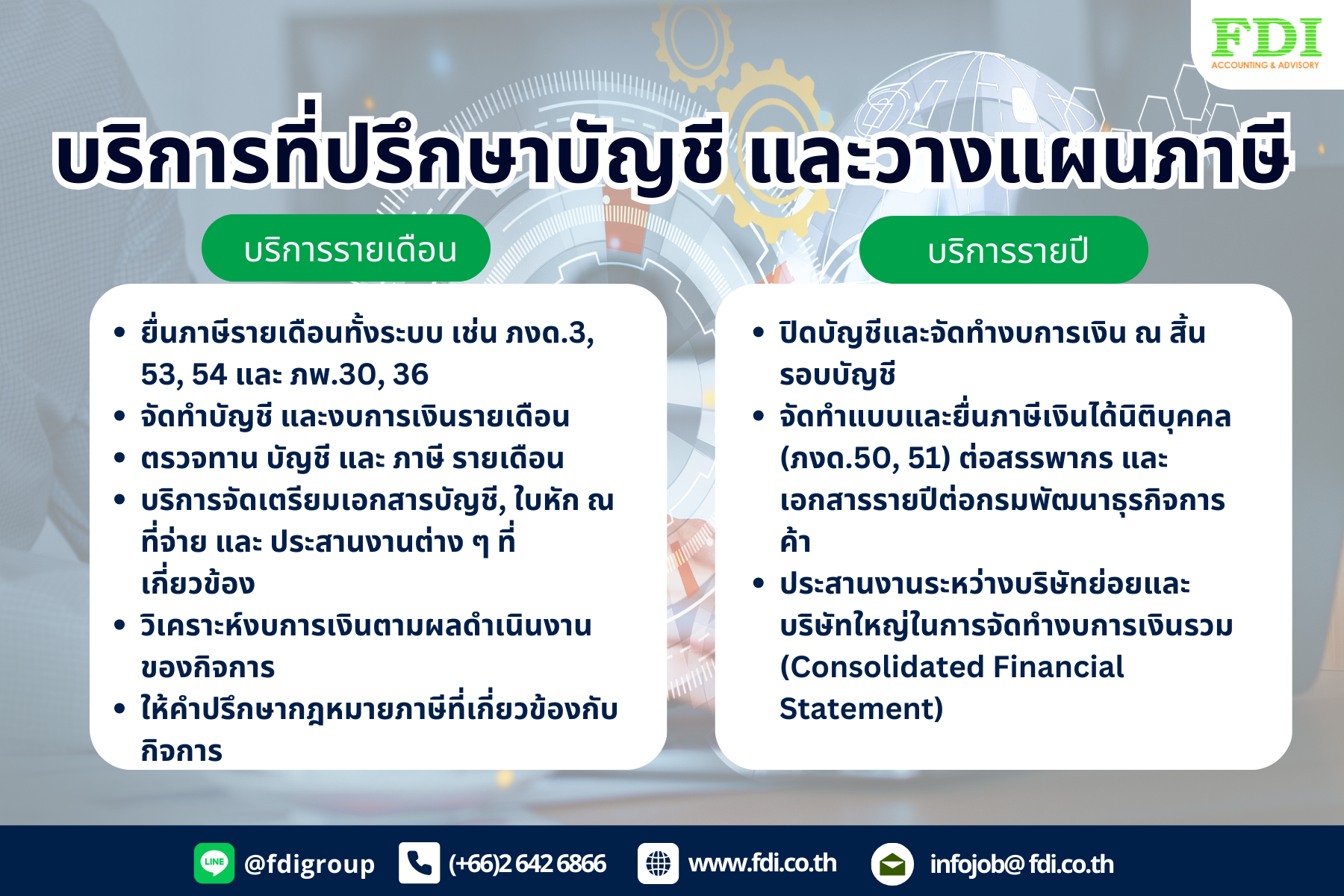A good accounting system is the heart of a sustainable business, along with guidance fromexperts in accounting and taxation.
No matter whether it is a small, medium, or large company, if there is no proper accounting system, it is like a ship without a compass. An accounting system is not just about “recording numbers” — it is a crucial tool that enables management to make effective decisions, operate in full compliance with the law, and plan taxes comprehensively with accuracy and transparency.
n this article, we will guide you to better understand what an “accounting system” is, why it is important, how businesses should begin implementing it so that it aligns with operations, and which factors should be considered to establish a more effective system. We will also share practical recommendations from our team of corporate accounting and tax advisors, who have extensive experience managing a wide range of Thai businesses.
What is an accounting system? How to start in a way that fits your business
Accounting System is a mechanism or process that businesses use to systematically collect, manage, analyze, and report financial information. It serves as a tool for internal management, compliance with legal requirements, and effective tax planning.
The accounting system may consist of:
- Documents and Reports – including the process of recording accounting entries (Journal Entries, General Ledger).
- Internal Control System – such as expense approval and document verification.
- Tools – such as accounting software or ERP systems.
- Financial Reports – such as the income statement, balance sheet, and cash flow statement.
- Personnel – such as experienced accountants.

Why is an “Accounting System” important for a business?
Many businesses overlook the importance of setting up a proper accounting system from the very beginning. This often leads to problems later in operations, such as incomplete bookkeeping, missing financial documents or records, errors in tax planning, or the inability to clearly analyze costs and profits. For this reason, it is essential to establish a solid accounting system and proper tax planning right from the start.
What are the essential components of a good accounting system?
To establish a good accounting system, it is not just about using off-the-shelf accounting software or having accounting staff to perform tasks. It must consist of interconnected components that can be systematically verified, including
1. Comprehensive document retention process
This begins with keeping receipts, invoices, tax invoices, purchase–sales documents, money transfer slips, and other records in an organized manner. In this area, businesses typically rely on accountants to review and compile the documents to ensure the highest level of accuracy and completeness.
2. Accounting recording procedures
This includes practices such as prior approval of expenses, segregation of duties between the purchaser, the payer, and the auditor to prevent fraud, as well as the involvement of external auditors to ensure maximum transparency.
3. Internal control system within the organization
This refers to mechanisms such as prior approval of expenses, segregation of duties between the purchaser, the payer, and the auditor to prevent fraud, as well as engaging external auditors to ensure the highest level of transparency.
4. Accounting Software or ERP (Enterprise Resource Planning)
It is recommended to use accounting software that has been officially certified by the Revenue Department. This ensures that the program complies with Thai tax regulations, supports the preparation of tax documents (such as VAT reports and withholding tax), and provides reliability in financial reporting for both legal compliance and business management.
5. Financial Reports
Financial statements must be prepared either monthly or quarterly in order to effectively track the company’s performance. These reports—such as profit and loss statements, balance sheets, and cash flow statements—are also essential for filing taxes accurately and on time. Regular preparation not only ensures compliance with tax regulations but also provides management with clear insights into profitability, cost control, and overall financial health of the business.
Examples of Business Problems Without an Accounting System
“An online store had excellent sales, but the owner had no idea how much profit they were actually making. This was because they failed to clearly separate product costs, advertising expenses, and shipping fees. As a result, at the end of the year, they discovered they had to pay several hundred thousand baht more in taxes than expected.”
This is a real problem that often occurs in businesses that start with strong knowledge in marketing or products but lack accounting and tax expertise. Establishing a solid accounting system from the beginning can therefore help prevent such issues.
Answer the question with 5 main reasons why the "accounting system" is the heart of a business
- A good accounting system makes financial information transparent and auditable, as well as helps in tracking and managing finances, reducing errors from backdated entries or missing documents.
- For legal and tax compliance in accordance with Thai law, which requires juristic persons to file taxes, bookkeeping enables businesses to know their income and expenses, ensuring internal transparency as well as proper tax filing. By law, a “juristic person” must maintain accurate accounting records and submit financial statements annually, along with other taxes as prescribed by law, in full compliance.
- Helps manage the business more efficiently, supports financial decision-making, and serves as crucial information for management and business partners. For example, accounting data enables business owners to know where the money goes, which products generate profit, and which expenses exceed the budget.
- Helps reduce the risk of retroactive audits. A good accounting system has complete supporting documents and full tax filings, preventing the Revenue Department or government agencies from imposing retroactive fines without valid grounds.
- Promotes more effective tax planning by utilizing data from the accounting system to plan taxes,adjust expenses appropriately, and develop tax strategies that maximize benefits for both the organization and the country.
Expert advice: How should SMEs start implementing an accounting system?
1. Plan from the very beginning of business operations
You should choose an accounting service provider with experience — not just one that “does bookkeeping for tax filing,” but one with a comprehensive vision and proven experience in handling corporate accounting to help businesses plan for growth.
2. Establish internal policies regarding documentation and finance
Whether in small or large organizations, this responsibility should be clearly defined. For those just starting out, it is recommended to establish guidelines such as who has the authority to approve payments, who keeps the documents, and who reviews the reports, in order to prevent duplication and reduce risks.
3. Implementing technology by using accounting software to assist in data recording
This can help store data in an organized manner, make document searches easier, reduce errors, and provide real-time access to information, enabling accounting staff to work more efficiently.

And how about your business? Do you already have a good “accounting system” in place?
FDI, as an advisor in accounting and tax planning for legal entities, is ready to help you set up a proper accounting system from the start, making data management easier and more convenient, while ensuring transparent and verifiable processes. With our team of deeply experienced experts, we provide accurate, fast, and reasonably priced consulting services to help organize your business systematically. We also offer proper tax planning advice and enhance key financial opportunities to support your business growth in a more sustainable way.
Consult on Accounting Systems and Tax Planning, or Request Initial Consultation for Legal Entities
📞 โทร: 02-642-6866, 02-642-6869, 02-642-6895
📧 อีเมล: infojob@fdi.co.th
🌐 เว็บไซต์: www.fdi.co.th
📱 LINE: @fdigroup
BlogArticles
What is a Balance Sheet? How to Read Financial Statements for Beginners!
งบดุลคืออะไร ? งบสำคัญที่คนทำธุรกิจควรรู้...
Read MoreAfter registering a company, how should you manage corporate accounting and tax planning?
ทำไมผู้ประกอบการ เจ้าของธุรกิจต้องทำบัญชีบริษัทและวางแผนภาษีนิติบุคคล ตามพระราชบัญญัติการบัญชี...
Read MoreSMEs must know: Set up an efficient accounting system How to start so that your business grows quickly and sustainably.
ระบบบัญชีที่ดี คือหัวใจของธุรกิจที่ยั่งยืน พร้อมคำแนะนำจากผู้เชี่ยวชาญด้านบัญชีและภาษี ...
Read More



